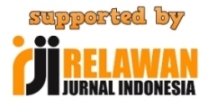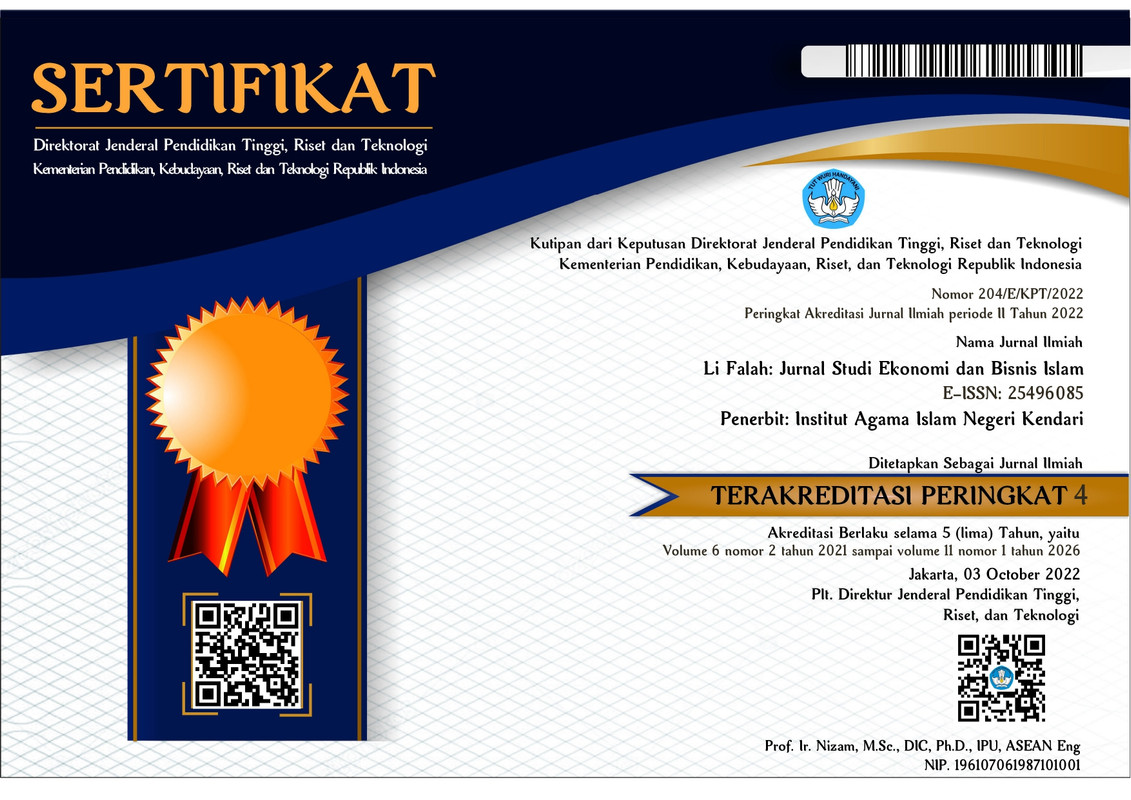Variant Development of the Halal Food Industry In Indonesia: The Role of Sharia Banking
Abstract
Keywords
Full Text:
PDFReferences
Ab Talib, M. S., & Hamid, A. B. A. (2014). Halal logistics in Malaysia: A SWOT analysis. Journal of Islamic Marketing, 5(3), 322–343. https://doi.org/10.1108/JIMA-03-2013-0018
Abdullah, M. W., Kadir, S., & Alaaraj, H. (2020). Sharia Financial Literation In Developing Sharia-Based Business For Rural Communities In South Sulawesi. Ikonomika, 5(1), 117–140. https://doi.org/10.24042/febi.v5i2.7050
Adiyanto, M. R., & Purnomo, A. S. D. (2021). Dampak Tingkat Literasi Keuangan Syariah Terhadap Minat Menggunakan Produk Keuangan Syariah. Jurnal Administrasi Kantor, 9(1), 1–12.
Affandy, F. F. (2020). STRATEGI PENGEMBANGAN INDUSTRI MAKANAN HALAL DI KOTA JAYAPURA. Iqtishaduna, 3(02), 705–717.
Ahyani, H., Mahfud, M., Waluyo, R., Ulya, W., & Muharir, M. (2021). The Potential of Halal Food as A Driver of the Economic Development in Regional Community. Jurnal Pariwisata Terapan, 4(2), 163. https://doi.org/10.22146/jpt.63771
Amini, A., Muhammad, I. F., & Suharto. (2022). Urgensi Halal Food Dalam Tinjauan Konsumsi Islami. LIKUID: Jurnal Ekonomi Industri Halal, 2(2), 1–14.
Annisa, A. A. (2021). Determining Model of Halal Lifestyle: A Study on the Role of Kopontren. Equilibrium: Jurnal Ekonomi Syariah, 9(1), 153. https://doi.org/10.21043/equilibrium.v9i1.10458
Bakhri, S., Saiban, K., & Munir, M. (2022). Peran Lembaga Keuangan Syariah dalam Industri Halal sudut Pandang Maqosid Syariah. Tasharruf: Journal of Islamic Economics and Busines, 03(01), 11–29. http://journal.itsnupasuruan.ac.id/index.php/tasharruf/article/view/88
Burhanuddin, Santoso, S., Lovika, A., & Pratikno, I. (2022). PERAN LITERASI KEUANGAN SYARIAH PADA PELAKU USAHA MAKANAN MINUMAN HALAL TERHADAP PENINGKATAN NILAI TAMBAH. Jurnal Pendidikan Dan Kewirausahaan, 10(2), 655–667.
Fathoni, M. A., & Syahputri, T. H. (2020). Potret Industri Halal Indonesia : Peluang dan Tantangan. Jurnal Ilmiah Ekonomi Islam, 6(03), 428–435.
Gunawan, I., & Maryono. (2022). Implementasi Manajemen Rantai Nilai Halal Dimasa Kenormalan Baru: Studi Pada Badan Usaha Milik Pesantren Al Mumtaz Kabupaten Gunungkidul. Jurnal JMD: Jurnal Manajemen Dakwah, 8(1), 51–78.
Harmoko, I. (2022). OPTIMALISASI INDUSTRI HALAL DI INDONESIA MELALUI. Reinforce: Journal of Sharia Management, 1(2), 105–121.
Kadir, S. (2019). Pengembangan Pengukuran Kinerja Dengan Pendekatan Maslahah Score Card. Ad-Deenar: Jurnal Ekonomi Dan Bisnis Islam, 3(2), 149–172. https://doi.org/10.30868/ad.v3i01.501
Kadir, S. (2022). Labelizing of Manufacturing Halal Industry Products for Achieving Customer Satisfaction In The Perspective of Maslahah Daruriyah. El-Qish: Journal of Islamic Economics, 2(1), 23–31. https://doi.org/10.33830/elqish.v2i1.4150.2022
Kamila, E. F. (2021). Peran Industri Halal Dalam Mendongkrak Pertumbuhan Ekonomi Indonesia Di Era New Normal. Jurnal Likuid, 1(01), 33–42.
Madjid, S. S. (2022). HALAL DI INDONESIA ( PADA MASA PANDEMIC COVID-19 ). Jurnal Pilar: Jurnal Kajian Islam Kontemporer, 13(1), 17–32.
Maulayati, R. R. (2019). Model pengembangan produk halal. Jurnal Investasi Islam, 6(1), 19–32.
Mayrowani, H. (2012). PENGEMBANGAN PERTANIAN ORGANIK DI INDONESIA The Development of Organic Agriculture in Indonesia. Forum Penelitian Agro Ekonomi, 30(2), 91–108.
Nanda, T. S. F., Ayumiati, & Wahyu, R. (2019). Tingkat Literasi Keuangan Syariah : Studi Pada. JIHBIZ: Global Journal of Islamic Banking and Finance, 1(2), 141–152.
Pujayanti, D. A. (2020). Industri Halal sebagai Paradigma bagi Sustainable Development Goals di Era Revolusi Industri 4 . 0. Youth & Islamic Economic Journal, 1(1), 20–32.
Rachman, M. A. (2019). Halal Industry in Indonesia: Role of Sharia Financial Institutions in Driving Industrial and Halal Ecosystem. Al-Iqtishad: Jurnal Ilmu Ekonomi Syariah, 11(1), 35–58. https://doi.org/10.15408/aiq.v11i1.10221
Razalia, R., Syahputraa, A., & Almira. (2021). Industri Halal di Aceh : Strategi dan Perkembangan. Jurnal Al-Qard, 6(1), 17–29.
Safura Azizah, N. (2020). Pengaruh Literasi Keuangan, Gaya Hidup Pada Perilaku Keuangan Pada Generasi Milenial. Prisma (Platform Riset Mahasiswa Akuntansi), 01(02), 92–101.
Sari, L. P. (2021). Pengembangan Industri Makanan Halal Di Indonesia. Al-Intaj, 6(2), 68.
Sofiawati, C. (2022). Perkembangan Industri Halal dan Kontribusinya Terhadap Perekonomian di Indonesia. Ecopreneur : Jurnal Ekonomi Dan Bisnis Islam, 3(2), 187–193.
Trimulato, & Mustamin, A. (2022). Peran Industri Keuangan Non-Bank syariah Dalam Mendukung UMKM. Proceedings of Islamic Economics, Business, and Philanthropy, 1(1), 50–68.
Waharini, F. M., & Purwantini, A. H. (2018). Model Pengembangan Industri Halal Food di Indonesia. Jurnal Muqtasid, 9(1), 1–13.
Wardani, A. K., Puji, E., & Sari, K. (2015). DETEKSI MOLEKULER CEMARAN DAGING BABI PADA BAKSO SAPI DI PASAR TRADISIONAL KOTA MALANG MENGGUNAKAN PCR ( POLYMERASE CHAIN REACTION ) Molecular Detection of Pork Contamination in Beef Meatballs in Malang Traditional Market Using PCR Method ( Polymerase Cha. Jurnal Pangan Dan Agroindustri, 3(4), 1294–1301.
Widianingsih, D., & Ashlihah. (2022). Model Pengembangan Industri Halal Food UMKM Di Jombang. JIES: Jpurnal of Islamic Economic Studies, 3(2), 100–108.
Yulia, Lady. (2015). Halal Products Industry Development Strategy Strategi Pengembangan Industri Produk Halal. Jurnal Bisnis Islam, 8(1), 121–162.
Yunita, H. I. D. (2018). Studi Tentang Peluang Dan Tantangan Industri Pangan Halal Terhadap Perekonomian Di Indonesia. Jurnal Ilmiah, 2(2), 1–19. https://jimfeb.ub.ac.id/index.php/jimfeb/article/view/5084
DOI: http://dx.doi.org/10.31332/lifalah.v7i2.5470
Copyright (c) 2022 Syahruddin Kadir

This work is licensed under a Creative Commons Attribution-ShareAlike 4.0 International License.
Li Falah : Jurnal Studi Ekonomi dan Bisnis Islam, Indexed In
Accredited By
View My Stats
Organized by : Fakultas Ekonomi dan Bisnis Islam
Published by : Institut Agama Islam Negeri Kendari
Jl. Sultan Qaimuddin No. 17 Baruga Kota Kendari Provinsi Sulawesi Tenggara
phone. +62401-3193710
Fax. +62401-3193710
Email: [email protected]



















